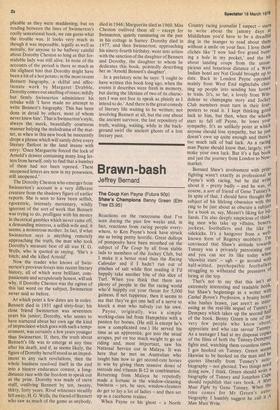Brawn-bash
Jeffrey Bernard
The Coup Ken Payne (Futura 90p) Shaw's Champions Benny Green (Elm Tree £5.95)
Reactions on the racecourse that I've seen during the past few weeks and, in fact, reactions from racing people everywhere, to Ken Payne's book have struck me as being pretty horrific. Great dollops of pomposity have been mouthed on the subject of The Coup by all from stable lads to members of the Jockey Club, but I make it a better read than the Racing Calendar and if I hadn't run out of pinches of salt while first reading it I'd happily take another bite of this slice of Turf. When you think that there are plenty of people in the flat racing world who'd happily cut your throat for 5,000 guineas, if not tuppence, then it seems to me that they've got one hell of a nerve to knock a man who naively cut his own.
Payne, originally, was a simple working-class lad from Hampshire with a passion for horses. (He still is except he's now a complicated one.) He served his time as an apprentice, got into the usual scrapes, put on too much weight to go on riding and, most important, saw his National Service out in Malaya. It was here that he met an Australian who taught him how to get second-rate horses to win by giving them massive doses of steroids and v;tamin B-12 in combination. Returning from Malaya he reputedly made a fortune in the window-cleaning business — yes, he says, window-cleaners do get to lay a lot of ladies — and then set up as a racehorse trainer.
When Payne or his ghost — a North
Country racing journalist I suspect — starts to write about the jammy days at Middleham you'd have to be a dreadful dog in the manger to read about them without a smile on your face. I love those clichés like 'I now had five grand burning a hole in my pocket,' and the bit about landing coups from the unsuspicious and luxurious distance of a West Indian hotel are Nat Gould brought up to date. Back in London Payne operated mainly from West End nightclubs chatting up people into sending him horses to train. It's, so far, a lovely from Win* dolene to champagne story and Jockey Club members must turn in their fourposters to read it. I kept thinking good luck to him, but then, when the wheels start to fall off Payne, he loses your sympathy. It's an unlikely point at which anyone should lose sympathy, but he just doesn't own up quite enough and there's too much talk of bad luck. As a racing man Payne should know that, largely, You make your own luck. But it's a fun book and just the journey from London to New' market.
Bernard Shaw's involvement with prig'
fighting wasn't exactly as professional .as Payne's with racing, but he did writer about it — pretty badly — and he was, 0' course, a sort of friend of Gene Tunney 's.
In spite of that, I should have thought the subject of his lifelong obsession with the ring to be just about as obscure a subje,ut
for a book as, say, Mozart's liking for bd. !lards. I'm also deeply suspicious of thinking men who take up villains, boxers, jockeys, footballers and the like as sidekicks. It's a hangover from a well' known form of Regency snobbery. convinced that Shaw's attitude towaros Tunney was a privately patronising one and you can see its like today wh.en, 'showbiz stars' — ugh — go around WO half-witted, psychopathic footballers struggling to withstand the pressures of being at the top. That's not to say that this isn't all extremely interesting and readable book, but Shaw's beginnings as a writer with Cashel Byron's Profession, a brainy boxer who bashes brawn, just aren't as inter' esting as the real-life sequel of TunneY Dempsey which takes up the second bah of the book. Benny Green is one of the , very few people who know about, appreciate and who can savour Twine. Y' As a teenager I had at my disposal coPies of the films of both the Tunney-DemPseY fights and, watching them countless times, I got hooked on Tunney. Green seeing likewise to be hooked on the man and' quotes liberally from Tunney's auto-, biography — not ghosted. Two things nee° doing now, I think. Green should write a biography of Tunney and Jonathan Calle should republish that rare book, A ,he Must Fight by Gene Tunney. When t time comes for Mr Green's auto' biography I humbly suggest he call it A Man Must Write.


































 Previous page
Previous page